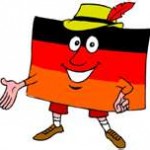German Noun Gender

Most world languages have nouns that are either masculine or feminine. German, besides capitalizing all nouns, goes them one better and adds a third gender: neuter. The masculine definite article (“the”) is der, feminine is die, and neuter is das. German-speakers just seem to know whether Wagen (car) is der or die or das. (It’s der Wagen.) And they also know that the other German word for car is das Auto. But when referring to cars by brand name, it’s always der Ford, der VW or der Mercedes.
It’s not the actual person, place or thing that has gender in German, but the WORD that stands for the actual thing. That’s why a “car” can be either das Auto (neut.) or der Wagen (masc.).
Forget linking gender to a specific meaning or concept. Although nouns for people often follow natural gender, there are exceptions such as das Mädchen, girl. There are three different German words for “ocean” or “sea”—all a different gender: der Ozean, das Meer, die See! And gender does not transfer well from one language to another. The word for “sun” is masculine in Spanish (el sol) but feminine in German (die Sonne). A German moon is masculine (der Mond), while a Spanish moon is feminine (la luna). It’s enough to drive an English-speaker crazy!
A good general rule for learning German vocabulary is to treat the article of a noun as an integral part of the word. Don’t just learn Garten (garden), learn der Garten. Don’t just learn Tür (door), learn die Tür. Not knowing a word’s gender can lead to all sorts of other problems: das Tor is the gate or portal; der Tor is the fool. Are you meeting someone at the lake (am See) or by the sea (an der See)?
But there are some hints that can help you remember the gender of a German noun. These guidelines work for many noun categories, but certainly not for all. For most nouns you will just have to know the gender. (If you’re going to guess, guess der. The highest percentage of German nouns are masculine.) Some of the following hints are a 100 percent sure thing, while others have exceptions.

The German Plural
One easy aspect of German nouns is the article used for noun plurals. All German nouns, regardless of gender, become die in the nominative and accusative plural. So a noun such as das Jahr (year) becomes die Jahre (years) in the plural. Sometimes the only way to recognize the plural form of a German noun is by the article: das Fenster (window) – die Fenster (windows).
Once you master these gender tips you never have to make a stupid guess. For instance, if you’re trying to remember the gender of a river, it’s dumb to guess das because all rivers are either masculine or feminine — as in der Rhein or die Donau (the Danube). If you know the rule, you have a fifty-fifty chance of being right instead of one in three. Another good hint: most rivers outside of Europe are masculine (except for some ending in -a or -e) — der Mississippi, der Nil, der Amazonas.
Remember, always learn any new German noun with its gender! But if you happen to forget the gender, you’ll find the following hints for German gender helpful:
MÄNNLICH – der
Always MASCULINE (der/ein):
- Days, months, and seasons: der Montag, der Juli, der Sommer (Monday, July, summer). The one exception is das Frühjahr, another word for der Frühling, spring.
- Points of the compass, map locations and winds: der Norden (north), der Süden (south), der Föhn (warm wind out of the Alps), der Scirocco (sirocco, a hot desert wind).
- Precipitation: der Regen, der Schnee, der Nebel (rain, snow, fog/mist)
- Names of cars and trains: der VW, der ICE, der Mercedes. (But motorbikes and aircraft are feminine.)
- Words ending in -ismus: der Journalismus, der Kommunismus, der Synchronismus (equal -ism words in English)
- Words ending in -ner: der Rentner, der Schaffner, der Zentner, der Zöllner (pensioner, [train] conductor, hundred-weight, customs collector). The feminine form adds -in (die Rentnerin).
- The basic “atmospheric” elements that end in -stoff: der Sauerstoff (oxygen), der Stickstoff (nitrogen), der Wasserstoff (hydrogen), plus carbon (der Kohlenstoff). The only other elements (out of 112) that are masculine are der Phosphor and der Schwefel (sulphur). Note: All of the other chemical elements are neuter (das Aluminium, das Blei, das Kupfer, das Uran, das Zink, etc.).
Usually MASCULINE (der/ein):
- Agents (people who do something), most occupations and nationalities: der Architekt, der Arzt, der Deutsche, der Fahrer, der Verkäufer, der Student, der Täter (architect, physician, German [person/male], driver, salesman, student, perpetrator). Note that the feminine form of these terms almost always ends in -in (die Architektin, die Ärztin, die Fahrerin, die Verkäuferin, die Studentin, die Täterin, but die Deutsche).
- Nouns ending in -er, when referring to people (exceptions: die Jungfer, die Mutter, die Schwester, die Tochter, das Fenster)
- Names of alcoholic drinks: der Wein, der Wodka (but das Bier)
- Names of mountains and lakes: der Berg, der See (but Germany’s highest peak, die Zugspitze follows the rule for the feminine ending -e, and die See is the sea).
- Most rivers outside of Europe: der Amazonas, der Kongo, der Mississippi
- Most nouns ending in -ich, -ling, -ist: der Rettich, der Sittich, der Schädling, der Frühling, der Pazifist (radish, parakeet, pest/parasite, spring, pacifist)
SÄCHLICH – das
Always NEUTER (das/ein):
- Nouns ending in -chen or -lein: das Fräulein, das Häuschen, das Kaninchen, das Mädchen (unmarried woman, cottage, rabbit, girl/maiden)
- Infinitives used as nouns (gerunds): das Essen, das Schreiben (eating/food, writing)
- Almost all of the 112 known chemical elements (das Aluminium, das Blei, das Kupfer, das Uran, das Zink, das Zinn, das Zirkonium, etc.) – except for six that are masculine: der Kohlenstoff (carbon), der Sauerstoff (oxygen), der Stickstoff (nitrogen), der Wasserstoff (hydrogen), der Phosphor and der Schwefel (sulphur). Note: Most of the elements end in -ium, a das ending.
- Names of hotels, cafés and theaters
- Names of colors used as nouns: das Blau, das Rot (blue, red)
Usually NEUTER (das/ein):
- Geographic place names (towns, countries, continents): das Berlin, das Deutschland, das Brasilien, das Afrika (but learn non-das countries, such as: der Irak, der Jemen, die Schweiz, die Türkei, die USA [plur.] , die Philippinen [plur.])
- Young animals and people: das Baby, das Küken (chick); but der Junge (boy).
- Most metals: das Aluminium, das Blei, das Kupfer, das Messing, das Zinn (aluminium, lead, copper, brass, tin/pewter; but die Bronze, der Stahl – bronze, steel)
- Nouns ending in -o (often cognates from Latin): das Auto, das Büro, das Kasino, das Konto (account), das Radio, das Veto, das Video – Note: Exceptions: die Avocado, die Disko, der Euro, der Scirocco, etc. A sharp observer will notice that most of the exceptions are either not from Latin (die Avocado) or are short forms of longer words that determine the gender (die Limo, short for die Limonade).
- Fractions: das/ein Viertel (¼), das/ein Drittel (but die Hälfte, half)
- Most nouns starting with Ge-: das Genick, das Gerät, das Geschirr, das Geschlecht, das Gesetz, das Gespräch (back of the neck, device, dishes, sex/gender, law, conversation), but there are many exceptions, such as der Gebrauch, der Gedanke, die Gefahr, der Gefallen, der Genuss, der Geschmack, der Gewinn, die Gebühr, die Geburt, die Geduld, die Gemeinde, die Geschichte, and others)
- Most borrowed (foreign) nouns ending in -ment: das Ressentiment, das Supplement (but der Zement, der/das Moment [2 diff. meanings])
- Most nouns ending in -nis: das Versäumnis (neglect; but die Erlaubnis, die Erkenntnis, die Finsternis)
- Most nouns ending in -tum or -um: das Christentum, das Königtum (Christianity, kingship; but der Irrtum, der Reichtum – error, wealth)
WEIBLICH – die (pron. DEE)
Always FEMININE (die/eine):
- Nouns ending in the following suffixes: -heit, -keit, -tät, -ung, -schaft – Examples: die Freiheit, die Schnelligkeit, die Universität, die Zeitung, die Freundschaft (freedom, quickness, university, newspaper, friendship). Note that these suffixes usually have a corresponding English suffix, such as -ness (-heit, -keit), -ty (-tät), -ship (-schaft).
- Nouns ending in -ie: die Drogerie, die Geographie, die Komödie, die Industrie, die Ironie (often equal to words ending in -y in English)
- Names of aircraft, ships and motorbikes: die Boeing 747, die Titanic, die BMW (motorbike only; the car is der BMW). The die comes from die Maschine, which can mean plane, motorbike and engine. – Helpful reminder: Ships are often referred to as “she” in English.
- Nouns ending in -ik: die Grammatik, die Grafik, die Klinik, die Musik, die Panik, die Physik – This is a fairly reliable predictor, but again there are some common exceptions, including der Atlantik, der Pazifik, der Katholik and das Pik (spade, cards). Most of the few -ik exceptions are logical, particularly the two oceans, since the German word for ocean is der Ozean.
- Borrowed (foreign) nouns ending in: -ade, -age, -anz, -enz, -ette, -ine, -ion, -tur: die Parade, die Blamage (shame), die Bilanz, die Distanz, die Frequenz, die Serviette (napkin), die Limonade, die Nation, die Konjunktur (economic trend). Note: Such words often resemble their English equivalent. A rare -ade exception: der Nomade.
- Cardinal numbers: eine Eins, eine Drei (a one, a three)
Usually FEMININE (die/eine):
- Nouns ending in -in that pertain to female people, occupations, nationalities: die Amerikanerin, die Studentin (female American, student), but der Harlekin and also many non-people words: das Benzin, der Urin (gasoline/petrol, urine).
- Most nouns ending in -e: die Ecke, die Ente, die Grenze, die Pistole, die Seuche (corner, duck, border, pistol, epidemic), but der Deutsche, das Ensemble, der Friede, der Junge ([the] German (male), ensemble, peace, boy)
- Nouns ending in -ei: die Partei, die Schweinerei (party [political], dirty trick/mess), but das Ei, der Papagei (egg, parrot).
- Most types of flowers and trees: die Birke, die Chrysantheme, die Eiche, die Rose (birch, chrysanthemum, oak, rose), but der Ahorn, (maple), das Gänseblümchen (daisy), and the word for tree is der Baum
- Borrowed (foreign) nouns ending in -isse, -itis, -ive: die Hornisse, die Initiative (hornet, initiative)

